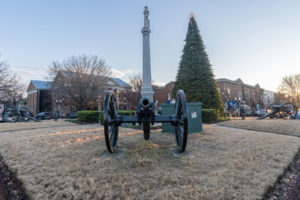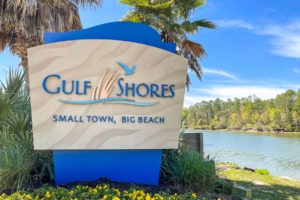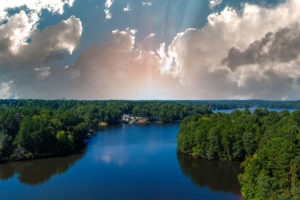Wish You Were Here: A Glimpse Into the World of Tourism PR
Published on January 24, 2023, at 11:03 a.m.
by Lauren Barnes.
There is a broad range of industries that a public relations practitioner can delve into — one of them being travel and tourism PR. Any city, regardless of its size, needs to maintain the relationship with its target audience, just like any public figure, brand or corporation. Public relations establishes a positive reputation, as well as promotes things to do, which “will naturally lead to an increase in visitors,” according to 5W PR.
For major cities such as Nashville or Atlanta, there are enough attractions to bring in crowds on their own. However, small towns across America gain a substantial economic boost from the tourism industry. This naturally raises the question: What is it like to be a public relations practitioner for a small town?
Three experienced PR practitioners gave their insights on what makes travel and tourism public relations stand out as well as some industry best practices.
Does your team do a lot of research to define your audience?
Matthew Maxey, director of public relations for Visit Franklin, said there is “quite a bit of research” when formulating the profile of a typical Franklin, Tennessee, visitor. With the help of external strategic communication companies, research is compiled from credit card and hotel data. Maxey said that messaging is then crafted with the visitor profile in mind, and that marketing is focused on areas where most of Franklin’s visitors originate.

Ally Dorrough, communications and marketing specialist for Gulf Shores & Orange Beach Tourism, agreed that a great deal of research goes into identifying her target audience. “Our marketing/communication department leads the research efforts determining audiences,” said Dorrough. According to a study on its website, Gulf Shores & Orange Beach Tourism also partners with a data analysis company to utilize surveys that identify common characteristics in visitors.
Maxey characterized his main audiences as leisure travelers, conventions, business bureaus and government funders. He said leisure travelers plan vacations and read travel and leisure magazines — they are the type of audience that comes to mind when someone thinks of tourism PR. Convention and business bureau representatives read trade publications and are motivated to fill conferences with attendees. If PR practitioners market their destination as a convention venue, they gain the opportunity to convert incoming business travelers into leisure travelers.
Government funders are composed of government leaders, stakeholders and the local community.
Dorrough placed her organization’s primary publics into three categories: 1) sports and event planners/event rights holders, participants, sports families and event-goers; 2) meeting planners who are already planning meetings in the market (repeat business) and meeting planners who could potentially plan a meeting in the market (new business), a public similar to Maxey’s convention and business bureau representatives; and 3) international tour operators and international receptive operators. In layman’s terms, these are a sort of travel agent. PR practitioners maintain relationships with them so they will promote their destination to their clientele.
What goes into branding for a town?
“A lot, if done properly, can go into branding a town. It goes back to storytelling and using proper ethos,” said Maxey. He described the process of narrowing hundreds of words down to what embodies the town best and then weaving that message into released content, such as commercials and photography.
Nikki Tyler, former marketing director for Peachtree City, Georgia, noted that when looking to rebrand, PR practitioners should take surveys and “hear what the people have to say.”
Are there any events your city hosts or do you promote a compiled calendar?
How involved a PR practitioner would be in their town’s events varies depending on the location. For Visit Franklin, Maxey said his team promotes the calendar of events but does not have a hand in their organization. For Gulf Shores & Orange Beach Tourism, Dorrough said her involvement ranges depending on the type of event.
“On the leisure side of our business, we strictly promote events taking place in Gulf Shores and Orange Beach through various avenues depending on the events and post them [on our calendar],” Dorrough explained. “On the sports and events side, we facilitate 120+ sports and major leisure events per year. These events are a mixture of events we own and operate, events we hold the contract for, events we provide grant funding to, and the list goes on.”

Tyler noted that some towns, such as Peachtree City, “create events to market them.” She explained that holding events provides opportunities for social media content, as well as generating online content with a high search engine optimization (SEO) “for when potential visitors look online for what to do this weekend.” Event planning and promotion depends on location and organization; this distinction is notable for students interested in tourism PR.
What was one of your favorite campaigns you ran?
Tyler spoke about a monthly event called Night Market that Peachtree City holds. Night Market features live music, art vendors, craft drinks and food trucks; the event was inspired by international outdoor markets and is a popular social gathering for locals and visitors alike. “Night Market came when I was redoing our website. Peachtree City didn’t have anything to do at night, so we needed something to talk about,” Tyler said.
“I’m most fond of when the whole city rallied around the Fuller Story Project. Like many other Southern towns, Franklin has a statue of Confederate soldiers, but the African American story wasn’t being told. Pastors and local historians got together to create markers to tell the missing stories and put up the first statues dedicated to U.S. Colored Troops,” said Maxey. “It was personally satisfying to get a feature story in the New York Times that Franklin is a Southern town doing things differently.”
“I had a big hand in rebranding our sports commission to become Gulf Shores l Orange Beach Sports & Events. It was a great process to walk through what a successful rebrand looks like,” said Dorrough. “Another project which won me the PRSA Bronze Anvil award was our meeting planner toolkit. It includes marketing tools for planners to plan and promote meetings.”
What makes tourism PR unique?
“We are usually in the good news business,” said Maxey, who has previously worked in both sports and political science PR. He said it is the relationship aspect that sets tourism PR apart. Maxey commented that travel and tourism journalists are generally friendlier and that the best interviews are conversational, such as when Maxey can tell the story of Franklin and include its many features, rather than push one product.
Tyler said that travel and tourism PR is unique because the product is unique. She emphasized that “every city is different,” so cities must customize their messaging.

“It’s an unexpected area of PR. What’s special is that we help people discover amazing experiences,” said Dorrough. “The people I’ve met are awesome professionals who work day in and day out to travel and make memories that last a lifetime.”
What is your favorite part of tourism PR?
Tyler said she loves traveling to new places, because on her return, she sees what she took for granted in a new light. She noted that travel and tourism PR is a field that can be done anywhere, since cities all over utilize public relations.
Dorrough said that travel and tourism PR has “the fun people” and mentioned the benefits of working in a destination. Despite travel and tourism crises such as natural disasters or the pandemic, communities are “bouncing back even better and welcoming those families back,” said Dorrough. “It all comes back to relationships. Research and relationships — that is our calling card.”
What would you recommend to students who would like to get into tourism PR?
There are a multitude of ways students can gain professional advice or experience. “Go to your local Convention and Visitor Bureau and ask to help,” said Tyler. “Offer to be a marketing assistant and help with the content calendar or write copy. Once you have experience, surrounding cities will have job openings and [you can] work your way up.”
Dorrough emphasized the benefit of talking with industry professionals and internships. “It’s neat when students can discover other industries outside agencies and corporations,” said Dorrough. “I wish I’d known more about tourism PR in college.”
Maxey agreed about the value of internships. He also mentioned getting journalism experience because “it helps to know where [journalists] are coming from.”
“As a general rule of PR, be a decent human,” said Maxey. “Our role is to make it as easy as possible to tell the story about the destination.”
Travel and tourism public relations is a great opportunity for public relations students who would like to work in an out-of-the-box environment. The field incorporates data and best practices such as content calendars and press releases, with the addition of the excitement and positivity that come with the travel and tourism industry culture.




